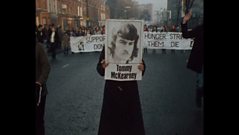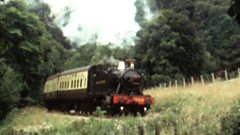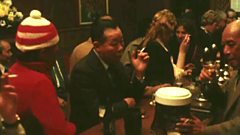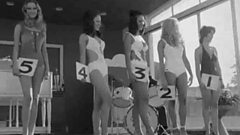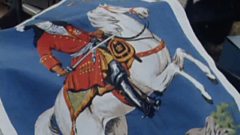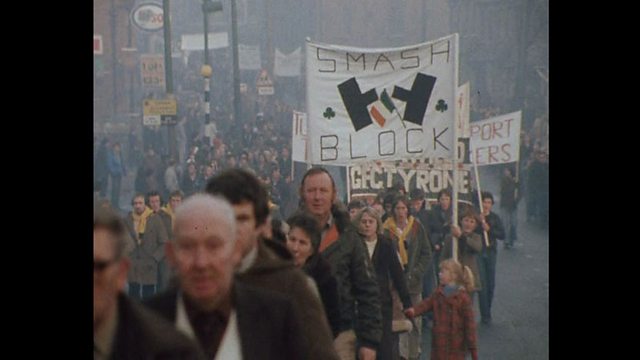
Republican hunger strike begins in the Maze
Nicholas Woolley reports on the origins of the 1980 republican hunger strike in the Maze prison, and the growing tensions in Northern Ireland.
This extended report by Nicholas Woolley on the origins of the 1980 hunger strike at the Maze prison begins with footage of a republican protest march on the Falls Road in Belfast. Woolley tells us that the hunger strike involving seven men, Leo Green, Raymond McCartney, Sean McKenna, Tommy McKearney, John Nixon, Tom McFeeley and Brendan Hughes, began on 27 October 1980. On 1st December the men were joined by three republican women prisoners in Armagh Gaol (Mairéad Farrell, Mairéad Nugent and Mary Doyle). They will continue their fast to death unless the government grants them their five demands. These are: the right to wear their own clothes; no prison work; free association; more letters and visits and full remission. Thousands of Catholics have demonstrated support for the hunger strikers.
Woolley reports from a hunger strike rally which is addressed by a protesting prisoner released that afternoon on 4 hours compassionate leave.
Woolley tells us that over the last four years there’s been a reduction in the number of troops on the ground and the number of killings is considerably less.
His report then locates to Pomeroy, Co Tyrone, where he links one of the hunger strikers, Tommy McKearney, to the killing of Stanley Adams who held two part time jobs: postman and UDR (Ulster Defence Regiment) soldier. He was shot dead in 1976 when he delivered a ‘decoy’ letter to an isolated farm. The following year McKearney was arrested and charged. He claimed he was beaten up at Castlereagh RUC station to make him confess. A prison doctor supported his claim which was then taken up by Amnesty International in a report that led indirectly to a reform of interrogation procedures. He was convicted by a judge sitting alone in a special court (known as a Diplock court) who deemed his confession admissible. Woolley explains that at the Maze two prison regimes exist side by side. In the old compounds, prisoners convicted after 1972 enjoy Special Category status while those housed in the new H Blocks are treated as ordinary criminals because they were convicted after March 1976 when Secretary of State Merlyn Rees abolished Special Category status. This change in policy triggered republican protests. First a ‘blanket’ protest (1976) then a ‘no-wash’ protest which escalated to the ‘dirty protest’ (1978) and finally the hunger strikes in October 1980.
Woolley interviews prison chaplain and school master Fr Denis Faul who taught McKearney and knows him well. He describes him as a determined young man. He also talks to Willie Ellison a friend of UDR soldier Stanley Adams who says Adams was a hard working lad who attended church regularly. He can’t understand Catholic support for the hunger strikers and says many of them are being intimidated. He believes the Catholic community needs more men like MP Gerry Fitt. (Fitt had spoken out against republican violence. He eventually lost his West Belfast seat and was forced from his home). Woolley gets a political perspective from Austin Currie of the SDLP (Social Democratic and Labour Party) who is opposed to granting political status. Woolley asks him if the protesters have the support of the majority of Catholics. Currie explains that the H-Block campaigners are appealing to the humanitarian sentiments of the Catholic community. Richard Reid, DUP (Democratic Unionist Party), is not opposed to general prison reform but believes the government should not give in to the prisoners’ demands. Richard McAuley, Information Officer of Provisional Sinn Fein the political wing of the Provisional IRA says the hunger strikers are doing it to gain political status and not to increase support for the republican movement.
Woolley concludes his report on the 44th day of the hunger strike by observing that if a prisoner dies violence will erupt and the IRA may have a chance to undo all the progress made towards peace over the last few years.
Duration:
This clip is from
More clips from 09/12/1980
-
![]()
Background to the republican hunger strike in the Maze
Duration: 03:48
-
![]()
The republican hunger strikers' five demands
Duration: 01:47
More clips from Nationwide
-
![]()
A Passion for Steam Trains—23/09/1975
Duration: 10:35
-
![]()
Eddie Braben on Liverpool—10/09/1979
Duration: 13:44
-
![]()
Southend Holiday—24/08/1973
Duration: 10:25
-
![]()
Scarva—10/07/1981
Duration: 08:28


